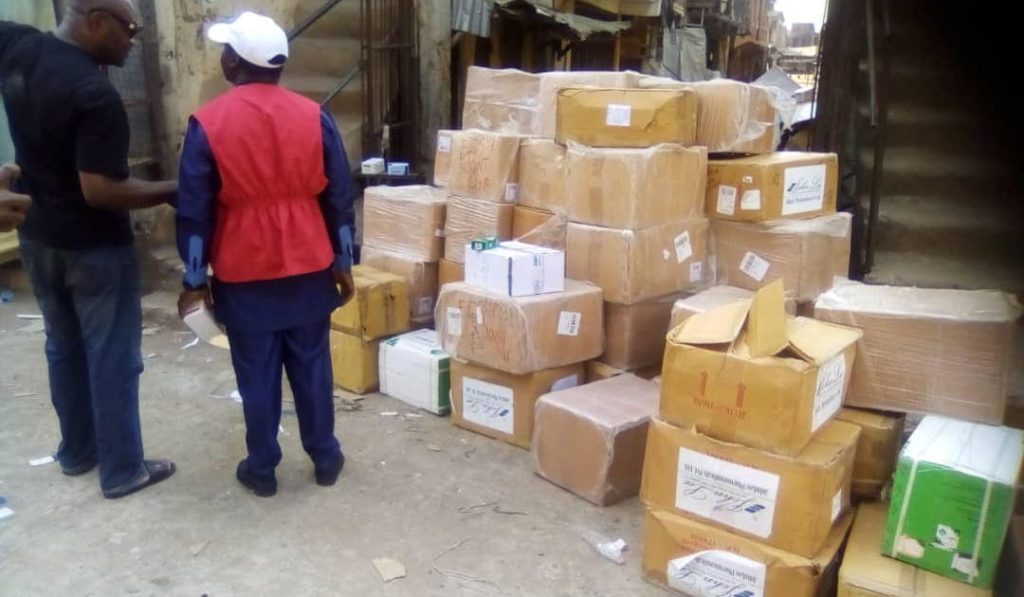The National Agency for Food and Drug Administration and Control (NAFDAC) launched a significant operation against counterfeit pharmaceuticals at the Onitsha Bridgehead drug market, also known as Ogbo-Ogwu, uncovering a massive network of illicit drug trafficking. This market, a major drug distribution hub in Nigeria and parts of Africa, became the focal point of an intense crackdown on substandard and falsified medications. The operation, led by NAFDAC’s South-East Zonal Director, Dr. Martins Iluyomade, revealed a sophisticated operation where counterfeit and banned drugs, including large quantities of Tramadol, were concealed within plumbing material shops to evade detection. This discovery highlighted the extent of the problem and the lengths to which criminals would go to distribute these dangerous products.
The operation’s success stemmed from intelligence gathering, which led NAFDAC officials to expand their search beyond the traditional drug stalls. They encountered significant resistance in the past, having been attacked and injured during a previous attempt to investigate these plumbing shops. This time, however, NAFDAC secured sufficient security personnel to ensure the safety of their operatives. The volume of seized counterfeit pharmaceuticals within the plumbing material shops was staggering, quickly surpassing the amount discovered in the drug market itself. Two trailer loads were filled within the first two days, a stark testament to the scale of the illicit operation. This prompted Dr. Iluyomade to anticipate that the mop-up exercise would likely extend over several days, possibly weeks, given the vast quantity of illicit drugs being uncovered.
This revelation exposed a troubling reality: Ogbo-Ogwu market, responsible for supplying an estimated 80% of the drugs circulating in Nigeria and parts of Africa, was significantly compromised by counterfeit and substandard medications. This posed a grave threat to public health, with unsuspecting consumers unknowingly purchasing potentially harmful or ineffective treatments. Dr. Iluyomade expressed deep concern for those who relied on this market for their medications, recognizing the devastating consequences of using these compromised drugs. He emphasized the urgency of the situation, stating that the influx of fake and dangerous drugs was contributing to worsening health outcomes, with patients experiencing no improvement or even further deterioration after taking these medications.
The NAFDAC team uncovered a range of violations, including adulterated, banned, substandard, and expired drugs, some even bearing fraudulent NAFDAC approval labels. The market’s complexity, with its numerous buildings and shops, provided an ideal environment for repackaging and re-dating expired medications under false pretenses. Over ten 40-foot trucks were filled with seized counterfeit pharmaceuticals during the first week of the operation, representing billions of naira worth of illicit products. This highlighted not only the vast financial implications of this illegal trade but also the widespread reach of these dangerous drugs within the Nigerian market and beyond.
Recognizing the national security implications of the widespread distribution of counterfeit drugs, the operation was coordinated by the Office of the National Security Adviser. This collaboration with security agencies, market leaders, and other stakeholders empowered NAFDAC to conduct a comprehensive and effective enforcement operation. This collaborative approach ensured the agency had the necessary authority and support to tackle this complex issue. The support from the National Security Adviser underscored the gravity of the situation and the commitment of the Federal Government to address the proliferation of counterfeit drugs across the country. This coordinated effort aimed not only to seize illicit products but also to dismantle the criminal networks responsible for their distribution.
Dr. Iluyomade drew a stark contrast between Nigeria and China, where the penalty for dealing in counterfeit drugs is the death penalty. In Nigeria, the punishment is significantly less severe—a few years in prison with the option of a fine. This disparity highlights the need for stricter legislation and enforcement to deter this dangerous activity. He reiterated NAFDAC’s unwavering commitment to eradicating substandard and falsified drugs, emphasizing the serious health risks posed by these illicit products. The ongoing operation aims to dismantle illegal drug networks and ensure compliance with safety regulations, reflecting NAFDAC’s determination to safeguard public health. The Chairman of the Onitsha Building Materials Traders Association, Chief Ejiofor Chikodi, expressed shock at the discovery of counterfeit drugs in his members’ shops and imposed a N500,000 fine on any shop owner found to be involved, signaling a move towards greater accountability within the market itself.


